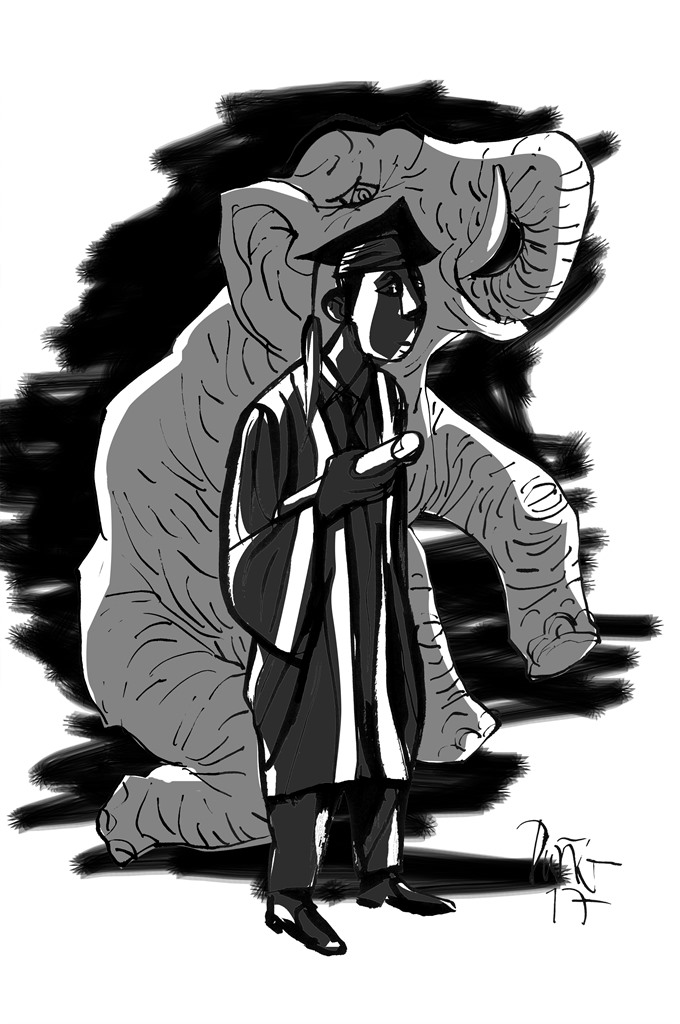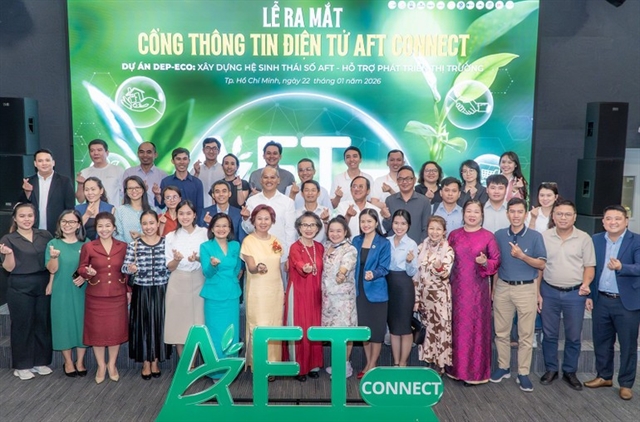

A short story by Đỗ Quang Vinh
 |
The Suicide Elephant
by Đỗ Quang Vinh
As I stood on stage for the graduation ceremony of our university one morning, I still thought about the ill-fated elephant in the city zoo from six months ago. The animal’s death was vivid in my mind, while the MC’s introduction sounded totally meaningless. Snapping out of my day dream, I noticed a slender girl in front of me walking off the stage. Looking around, I saw I was alone on stage.
The elephant killed itself on a weekend morning, a day that seemed like yesterday to me. I had been on a date with my sweetheart, driving her about on my motorcycle. After a ride along the streets, with her perched uncomfortably behind me, I decided to stop somewhere to relax. The park we normally went to was too crowded, as were our favourite cafes. It felt like our city had shrunk under the hot sun, with horns blaring and a stifling atmosphere.
“Where should we go, darling?” I asked her.
“What about the zoo? I haven’t been there in a long time.”
“The zoo! Is there anything worth seeing there?”
“Some new animals, I think. We might as well go instead of driving about aimlessly.”
“Agreed! Thinking of it, I haven’t been there since I was ten years old.”
* * *
The motorbike parking fee had increased noticeably, more than fifty per cent from when I first visited at the age of ten.
“All things considered, it’s still reasonable. Things have changed greatly since then: the world economic crisis, inflation, rocketing fuel prices, our WTO integration, the internet boom, population growth, famine in Africa, war in the Middle-East, unrest in Tibet and, last but not least, North Korea’s threats of using nuclear weapons,” I said.
“Anything else?” she asked me, giggling.
“Oh, this, that and the other,” I answered.
The zoo was packed with visitors, especially little children. They teased animals in cages, big and small, or demanded their parents take photos of them. The lawns were full of people eating lunch. Rubbish was strewn around everywhere. It was a mess!
The animals seemed very pensive in their cages. Several chimps yawned, lying lazily in the shade; some crocodiles sunbathed with mouths wide open, whereas a few tigers, standing or lying, gazed at the viewers. Oddly enough, all of them seemed calmer than the crowd around them, despite their confinement. Maybe, they were so used to the behaviour of humans it had become monotonous.
My lady quickly led me to look for enclosures far away from the stench of food and rubbish that permeated most of the zoo.
After walking round the zoo, we stopped at a huge cage for elephants. One of them was lazily walking to and fro, while the other was asleep beside a pond. The whole area was surrounded by children. The elephants might have been the most photographed things in the zoo. In pictures they looked huge, but here they seemed small compared with the vast zoo. Their rough and ashy-gray skin made me sad.
“When did you last see one?” I asked my sweetheart.
“A long time ago, I’m not sure” she replied. “Once, I saw a beautiful elephant in a circus on the way to the theatre. To the best of my memory, that beast was much bigger than the ones here.”
We went closer to the wired fence. Surprisingly, the prone elephant slowly stood up then started walking. When it reached the centre of the enclosure, it raised its trunk high with an ear-splitting shout, as if it wanted attention. At once, all eyes were fixed on it. After that it began coiling its trunk then inserted its end into its mouth. The trunk entered slowly and deeply into its mouth. The bizarre scene attracted attention, with the area around the enclosure becoming more and more crowded with every passing second. A few minutes later, several zoo keepers rushed towards the enclosure. Flashes of cameras illuminated the performing animal.
In the meantime, the beast’s trunk was going deeper and deeper into its throat. Suddenly, its eyes lit up terribly as if it was choking. From its mouth, painful groans could be heard. The zoo keepers had barely got in when the poor animal collapsed. Its legs trembled violently. Minutes later, it took its last breath. When they managed to pull the trunk out of its mouth a stream of saliva and blood oozed out.
The animal’s violent death was a shock to all the people watching.
The other elephant had been motionless the entire time.
* * *
“We’d better leave this horrifying place at once,” said my sweetheart, pulling me out of the crowd.
“Where should we go, darling?” I asked.
“Take me home!”
Reaching my home after dropping her off, I went straight to bed. In the dark, the image of the suicidal animal appeared in my mind. I saw its death as a sign of an intelligent beast. “It was a brave protest against bondage,” I whispered to myself. I clenched my teeth, holding my knees tightly.
* * *
Sometimes, I only went to lectures to get my name on the register before strolling around campus, from one building to another, and then I would ring my lady for a chat.
When she was too busy to talk, I either went to an empty classroom to lie on a desk and stare at the ceiling fan over me, or sat on a bench, surrounded with high buildings, near to a badminton court with a torn net hung between two rusty posts.
Sometimes on dreary afternoons, a downpour would come down and last for hours while the wind roared violently in the empty space between the high-rises. The whole university would be flooded ankle-deep in muddy rainwater. When that happened, I stood on the seventh floor of my block of flats to observe the dim surroundings.
* * *
Often, the university deputy president, my father’s old friend, asked me to come to his office. He was obese with a pale complexion, two baggy cheeks, a bald head, glassy eyes and a grey beard. In his white long-sleeved shirt with a red tie, he was always seated behind a large desk with his title plate in the centre, beside two stacks of files close to the walls and a pot of artificial flowers under the window. What struck me most was that the door of his air-conditioned room was always shut. I had never seen him playing sports on campus, nor found him attending anything in the conference hall. Worse still, he never took part in extramural activities. It seemed that he had been placed there as a wooden statue with the same clothing in the same armchair. Whenever he asked to see me, I wondered if something ominous was about to happen.
* * *
“I promised your father that you could pass any course here without taking exams,” he said to me one day. “On the completion of your course, you’ll get an ordinary degree, no matter how you perform, on the condition that you don’t skip too many classes. Let’s work together on this, ok? Bear in mind that everything has its limit,” he concluded. I nodded my thanks, feeling we had just finished a dodgy deal that was indispensable in our society.
“Well, you can leave now,” he told me.
Once outside, I stood in front of his door to see if there was anybody who wanted to get in or if he wished to go out.
“I’d better leave at once; otherwise, I might hinder somebody’s work,” I said to myself. “He and his place are already consigned to oblivion,” I whispered.
* * *
The death of the elephant became the talk of the town. Every media outlet covered the tragedy. The zoo was condemned for lacking responsibility for its animals. Flowers were placed around its enclosure together with countless candles to mourn the poor animal. Debate over its death gripped the country for days on end. Its death became a symbol of an act of bravery and desire for freedom.
“I’ve thought a lot about that elephant,” I said to my sweetheart on the phone while I was in a lecture.
“Don’t talk more about that terrible day,” she replied angrily.
“Whatever, I think it was admirable, strong willed and determined. It chose death rather than a life in confinement.”
“Ugh, enough! I keep having nightmares about it.”
“Really?”
An embarrassed silence ended our chat.
Obviously, she felt uneasy talking about the elephant.
Putting my mobile into my pocket I yawned loudly.
* * *
“Have you seen this?” said one of my classmates as he showed his iPhone to me.
I looked around the lecture room, full of unfamiliar faces, and then took a glimpse at his screen.
“What’s that?”
“An elephant committing suicide by swallowing its trunk!”
“Oh, it killed itself like that? What a joke!”
“Absolute banter!” he said merrily.
It turned out that the whole incident had been recorded and shown on TV. I watched it again. I frowned at the scene. The screams of the viewers drowned out the painful roar of the poor animal. Its death on the little screen seemed like a comedy: the beast collapsing while the viewers shouted loudly for joy or in horror; it was unclear.
My friend laughed and laughed when he watched the clip.
“It’s fake news,” I told him.
“Not quite! It’s been covered in the mainstream media.”
“How many times have you seen it?” I asked him.
“A lot.”
“If you had been present, you wouldn’t have watched it so much.”
“You said that as if you were there. Bollocks!”
“I was there indeed, in the first row of viewers. Look at my back on the screen.” I pointed at my image on it.
After saying so, I rushed to the toilet because I felt sick. I vomited up what I had eaten earlier.
Half an hour later, I stepped out of the toilet and sat on a bench near the noticeboard.
I did not want to loiter any longer. Neither did I wish to go back to our tutorial room to listen to meaningless discussions. It seemed to me that nothing existed: the past, present or future.
I looked up with a heavy sigh and stared at the window of the deputy president’s room on the fifth floor. Surely, his conditions and behaviour were the same: sitting in the soft rotating armchair, feet resting on his large desk and body relaxed to the utmost.
* * *
“In six months you’ll graduate, won’t you?” asked my father at dinner with an icy look behind his glasses.
“Dad, I still have to sit my exams.”
“Don’t worry! With a degree, your Uncle Ba will arrange a job for you. Working with him, your future will be secure. Years ago I did him a favour, now he owes me one. By his side, your career will be set for your entire life; you won’t need to worry about any competition.”
“That means that later I’ll do the same for somebody else, getting them a job they don’t deserve?” I asked him, looking squarely at his unmoved countenance.
“Such is life, my son! Remember, looking out for your family comes first,” he added.
“Some people can only dream of getting a job!” chimed in my mother.
“On the contrary, a lot of people’s dreams will never come true,” I retorted angrily.
“Hmm, you’ll understand when you grow up. Stability is most important!” said my father in a booming voice.
The meal seemed like one I had eaten thousands of times.
* * *
By the end of that week, I returned to the zoo, alone. The sky was overcast. The surroundings were dreary. The atmosphere seemed much quieter. In a thick coat, with a pair of sun glasses and a black cap on my head, I reached the zoo’s booking-office to get a ticket. I went straight to the elephant enclosure. I was vaguely afraid that I might be recognised by someone from that fateful morning.
The large cage was empty. On its door, a notice said the enclosure was temporarily shut. Withered flowers lay scattered on the ground. The stench of tainted food could be felt clearly. Inside the enclosure, the floor was wiped clean.
Suddenly, I saw an old zoo keeper sweeping yellow leaves off the green lawn.
“Sir, can I ask you one question?” I said to him loudly.
He looked at me without saying a word, then he continued his work. I called him again and again, but in vain. “He’s ignoring me because he must be fed up with people’s foolish questions about the death of the elephant,” I said to myself.
That afternoon, it rained heavily. Lying on bed I looked for information online about the animal’s death.
It turned out that the poor elephant’s forefathers had been captured and sold to a French zoo years ago. The suicidal animal was offered to our city zoo during the French president’s visit to our country. After three generations in bondage, it lost the will to live. Usually, elephants lived in a herd. But in the zoo, they were lonely. Worse still, living in an enclosure, they couldn’t find a partner. As a result, they died alone, as our poor elephant did.
I looked at a photo of the ill-fated animal when it was only one year old. I lamented its short and miserable existence. Thinking of the moment when its blood and saliva were oozing out of its mouth, I felt sick again.
* * *
When my course finished, the graduation ceremony was held on campus. Wearing a dark red graduation gown, together with a mortar-board on my head, I found the whole thing awkward. Looking around, I saw my father in his Sunday best with an icy countenance. He was sitting next to my mother, busy filming proceedings with her iPhone. Further down, I saw my sweetheart waving to me joyfully. When the university president finished his boring speech, I received a paper roll tied up with a yellow silk ribbon. At the moment, music resounded loudly amid the frantic applause. I had an empty feeling. After that I stared at the high window of the deputy president’s office. Surely, he was sitting there in his decent clothes over his obese body, with a pale complexion, a bald head and two baggy cheeks.
From now on, there were no more days with aimless strolls. I had to become stable in my career, stable for good. Such would be my life.
The poor elephant died six months ago. Another one had replaced it in the enclosure. Nobody missed the miserable animal, but me, perhaps.
Three generations of elephant living in bondage. How terrible!
A reporter came up to me.
“As a new graduate, what are your hopes for the future?” he asked me.
I looked around. A lot of people were waiting for my reply. Among them was my father, who was frowning angrily at me.
“Sorry, I’m not an elephant,” I replied quietly.
“Sorry, could you repeat that?” he asked, flummoxed.
“Doesn’t matter,” I answered then left the stage with a broad smile.
“I’m not an elephant! Unfortunately, I haven’t got a trunk to swallow!” I whispered to myself.
Translated by Văn Minh




